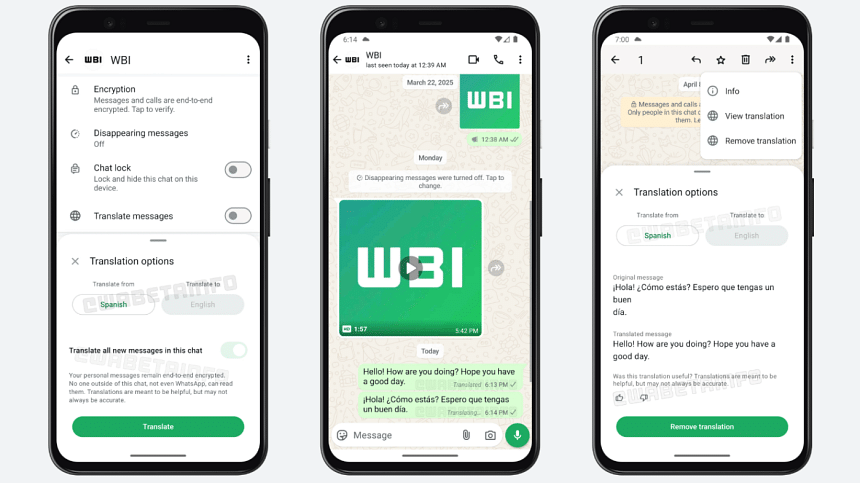WhatsApp has announced that it is introducing a new in-app translation feature that enables users to translate messages and channel updates directly within the app, using entirely on-device processing to maintain privacy and preserve end-to-end encryption. The update is currently being tested with select beta users as part of the WhatsApp beta for Android 2.25.
12.25 release, available via the Google Play Store. According to a blog by WABetaInfo (WBI), the translation tool allows users to download language packs and translate messages in real time without any message data being sent to external servers.

This on-device approach mirrors the technology behind WhatsApp's voice message transcription tool, ensuring that translations are processed locally while user data remains secure. Language options currently include Spanish, Arabic, Portuguese (Brazil), Hindi and Russian, with the possibility of more languages being supported in future updates. A language detection pack is also available, helping to manage multilingual group conversations by automatically identifying and translating messages, as per WBI.
Although translations are carried out using lightweight local language packs, WhatsApp acknowledges that their accuracy may not always match that of cloud-based services. Users can provide feedback on translations through an optional in-app form, but no original or translated content is shared with Meta, even when feedback is submitted. According to WBI, the translation function extends beyond private conversations to group chats and public channels.
However, it is turned off by default and must be manually enabled by users. Downloaded language packs can be managed or removed at any time through WhatsApp's storage settings, giving users full control over space and functionality. The feature is currently limited to select beta users but is expected to be rolled out more widely in the coming weeks.
WhatsApp has announced that it is introducing a new in-app translation feature that enables users to translate messages and channel updates directly within the app, using entirely on-device processing to maintain privacy and preserve end-to-end encryption. The update is currently being tested with select beta users as part of the WhatsApp beta for Android 2.25.
12.25 release, available via the Google Play Store. According to a blog by WABetaInfo (WBI), the translation tool allows users to download language packs and translate messages in real time without any message data being sent to external servers.
This on-device approach mirrors the technology behind WhatsApp's voice message transcription tool, ensuring that translations are processed locally while user data remains secure. Language options currently include Spanish, Arabic, Portuguese (Brazil), Hindi and Russian, with the possibility of more languages being supported in future updates. A language detection pack is also available, helping to manage multilingual group conversations by automatically identifying and translating messages, as per WBI.
Although translations are carried out using lightweight local language packs, WhatsApp acknowledges that their accuracy may not always match that of cloud-based services. Users can provide feedback on translations through an optional in-app form, but no original or translated content is shared with Meta, even when feedback is submitted. According to WBI, the translation function extends beyond private conversations to group chats and public channels.
However, it is turned off by default and must be manually enabled by users. Downloaded language packs can be managed or removed at any time through WhatsApp's storage settings, giving users full control over space and functionality. The feature is currently limited to select beta users but is expected to be rolled out more widely in the coming weeks.
.
Technology

WhatsApp is rolling out in-app translation services

WhatsApp has announced that it is introducing a new in-app translation feature that enables users to translate messages and channel updates directly within the app, using entirely on-device processing to maintain privacy and preserve end-to-end encryption.















